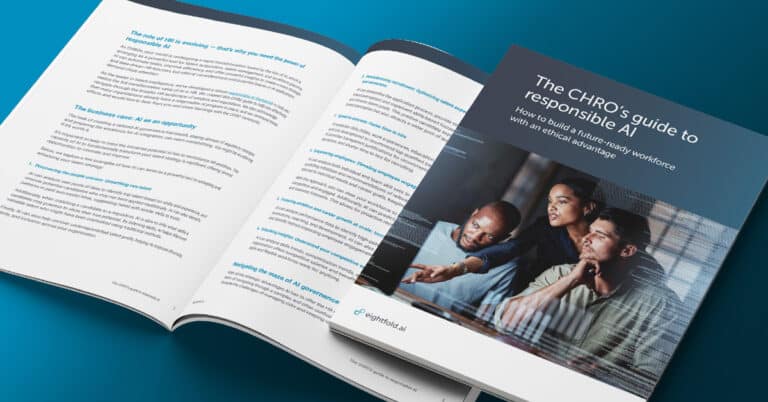
CHRO’s guide to responsible AI
CHRO’s guide to responsible AI
As CHROs, your world is undergoing a rapid transformation fueled by the rise of AI, which is emerging as a powerful tool for talent acquisition, talent management, and workforce planning.
AI can automate tasks, improve efficiency, and offer powerful insights to create a more strategic and data-driven HR function, but ethical considerations and potential biases in AI applications demand close attention.
As the leader in talent intelligence, we’ve developed a robust responsible AI framework to help you realize the full transformative value of AI in HR. We created this CHRO guide to help you effectively navigate through the broader HR landscape of vendors and regulations.
Read on to learn more about:
- Discovering hidden talent
- Hiring best-fit talent faster
- Elevating internal talent to new roles and opportunities
- Increasing retention
- Unlocking key talent insights to drive your business forward
The role of HR is evolving — that’s why you need the power of responsible AI
As CHROs, your world is undergoing a rapid transformation fueled by the rise of AI, which is emerging as a powerful tool for talent acquisition, talent management, and workforce planning. AI can automate tasks, improve efficiency, and offer powerful insights to create a more strategic and data-driven HR function, but ethical considerations and potential biases in AI applications demand close attention.
As the leader in talent intelligence, we’ve developed a robust responsible AI framework to help you realize the full transformative value of AI in HR. We created this CHRO guide to help you effectively navigate through the broader HR landscape of vendors and regulations. We also acknowledge that many organizations already have a responsible AI program in place, and we commend those efforts and would love to hear from you and share learnings with the CHRO community.
The business case: AI as an opportunity
The task of creating a tailored AI governance framework, staying abreast of regulatory changes and preparing the workforce for AI integration, can seem overwhelming. You might be wondering if it’s worth it.
It’s important to keep in mind the immense potential AI has to revolutionize HR practices. The capacity of AI to fundamentally transform your talent strategy is significant, offering several opportunities to innovate and improve.
Below, we explore a few examples of how AI can serve as a powerful tool in reshaping and enhancing your talent strategy:
1. Discovering the purple unicorn: Unearthing rare talent
AI can analyze vast pools of data to identify top talent based on skills and experience, and uncover potential candidates who may not have applied traditionally. AI can also identify patterns in past successful hires, suggesting talent with similar skills to invite.
Additionally, when matching a candidate to a requisition, AI is able to infer what skills a candidate may possess to show their true potential. By inferring skills, AI helps discover valuable talent who might have been overlooked using traditional methods.
Finally, AI can also help uncover underrepresented talent pools, helping to improve diversity, equity, and inclusion across your organization.
2. Revolutionizing recruitment: Optimizing talent experience to boost talent attraction and conversion
AI can streamline the application process, provide timely feedback to candidates (improving brand perception) and implement skills-based focuses in application processes to ensure fair and diverse talent pools. This positive candidate experience not only improves your employer brand perception but also attracts a wider pool of qualified applicants.
3. Speed to success: Faster time to hire
AI analyzes data (titles, work experiences, education, skills, and natural language of résumés and job descriptions) to recommend top qualified candidates based on objective criteria. AI provides transparent justifications for recommendations, fostering trust, informed hiring decisions, and shorter time to hire for recruiting.
4. Empowering employees: Elevating employee engagement
AI can analyze both individual and team skill sets to identify any gaps. This allows for targeted upskilling initiatives and recommendations of relevant learning and development opportunities tailored to individual needs and career goals, keeping your employees engaged and motivated.
With this approach, you can steer your workforce to possess the necessary skills to stay competitive and engaged. Additionally, AI can predict future talent needs based on market trends and business forecasts. This allows for proactive recruitment and strategic workforce planning.
5. Fostering ambition and career growth at scale: Increased retention
AI can analyze performance data to identify high-potential employees and provide insights for promotions, coaching, and development. AI can also analyze employee data to predict flight risk and identify factors impacting employee engagement, allowing for proactive retention strategies.
6. Unlocking insights: Understand your competitive edge
AI can analyze skills trends, compensation trends, and market data to ensure your organization offers competitive salaries and benefits packages, and that you’re building an agile and flexible workforce ready for anything.
You might also like...
Get the latest talent news in your inbox every month
By submitting this form, I consent to Eightfold processing my personal data in accordance with its Privacy Notice and agree to receive marketing emails from Eightfold about its products and events. I acknowledge that I can unsubscribe or update my preferences at any time.
